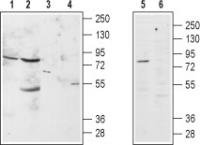alpha 1b Adrenergic Receptor (ADRA1B) Rabbit Polyclonal Antibody
Other products for "ADRA1B"
Specifications
| Product Data | |
| Applications | FC, IF, IHC, WB |
| Recommended Dilution | WB: 1:200-1:2000; IHC: 1:100-1:3,000; FC: 1:50-1:600 |
| Reactivities | Human, Rat |
| Host | Rabbit |
| Clonality | Polyclonal |
| Immunogen | Peptide (C)KNANFTGPNQTSSNS, corresponding to amino acid residues 21-35 of human a1B-adrenoceptor . Extracellular, N-terminus. |
| Formulation | Lyophilized. Concentration before lyophilization ~0.8mg/ml (lot dependent, please refer to CoA along with shipment for actual concentration). Buffer before lyophilization: Phosphate buffered saline (PBS), pH 7.4, 1% BSA, 0.05% NaN3. |
| Purification | Affinity purified on immobilized antigen. |
| Conjugation | Unconjugated |
| Storage | Store at -20°C as received. |
| Stability | Stable for 12 months from date of receipt. |
| Gene Name | adrenoceptor alpha 1B |
| Database Link | |
| Background | Adrenoceptors (also called Adrenergic receptors) are the receptors for the catecholamines adrenaline and noradrenaline (called epinephrine and norepinephrine in the United States). Adrenaline and noradrenaline play important roles in the control of blood pressure, myocardial contractile rate and force, airway reactivity, and a variety of metabolic and central nervous system functions. The Adrenoceptors are members of the G-protein-coupled receptor (GPCR) superfamily of membrane proteins. They share a common structure of seven putative transmembrane domains, an extracellular amino terminus, and a cytoplasmic carboxyl terminus. The Adrenoceptors are divided into three types: a1, a2 and Ã? adrenoceptors. Each type is further divided into at least three subtypes: a1A, a1B, a1D, a2A, a2B, a2C, Ã?1, Ã?2, Ã?3.They are expressed in nearly all peripheral tissues and in the central nervous system. All a1-Adrenoceptors (a1-ARs) activate phospholipases C and A2. In addition to mobilizing intracellular calcium, the a1-ARs have also been shown to activate calcium influx via voltage-dependent and independent calcium channels. The a1B-Adrenoceptor shows the highest levels in the spleen, kidney, cerebellum, and fetal brain. a1B Adrenoceptor causes contraction of smooth muscle cells and thereby controls vascular tone, blood pressure, and accelerates the development of atherosclerosis. |
| Synonyms | ADRA1; ALPHA1BAR |
| Note | This antibody was tested in live cell imaging. Please see IF/ICC data for detail. |
| Reference Data | |
| Protein Families | Druggable Genome, GPCR, Transmembrane |
| Protein Pathways | Calcium signaling pathway, Neuroactive ligand-receptor interaction, Vascular smooth muscle contraction |
Documents
| Product Manuals |
| FAQs |
{0} Product Review(s)
0 Product Review(s)
Submit review
Be the first one to submit a review
Product Citations
*Delivery time may vary from web posted schedule. Occasional delays may occur due to unforeseen
complexities in the preparation of your product. International customers may expect an additional 1-2 weeks
in shipping.






























































































































































































































































 Germany
Germany
 Japan
Japan
 United Kingdom
United Kingdom
 China
China






